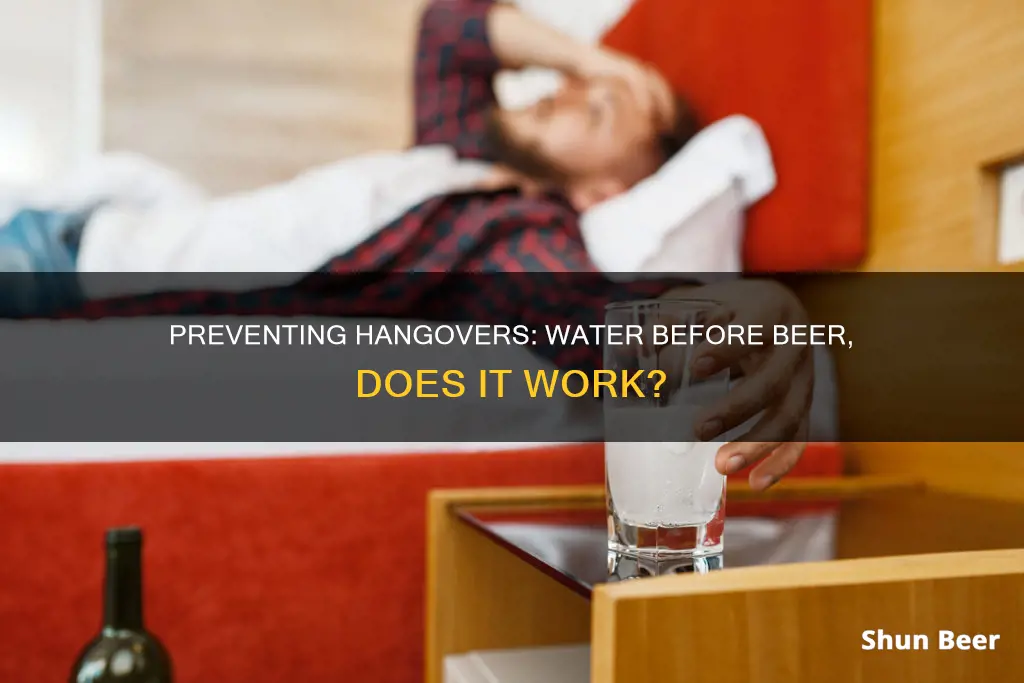
Drinking water is often touted as a way to prevent a hangover after consuming alcohol. While there is little research to support this claim, drinking water can help mitigate some of the symptoms associated with a hangover, such as dehydration, which can cause thirst, fatigue, and headaches. Water may also help flush toxins from your body more efficiently. Additionally, drinking water between alcoholic drinks can help slow down alcohol absorption and reduce overall alcohol consumption, which may indirectly reduce the likelihood or severity of a hangover. However, the best way to avoid a hangover is to drink in moderation or abstain from alcohol altogether.
| Characteristics | Values |
|---|---|
| Effectiveness of drinking water before drinking beer | Drinking water before drinking alcohol may help to prevent a hangover by slowing down the body's absorption of alcohol and mitigating the dehydrating effects of alcohol. However, there is limited research to support this claim. |
| Other ways to prevent a hangover | Drinking water while drinking alcohol, drinking in moderation, eating before drinking, drinking lighter-coloured drinks, getting enough sleep, drinking coffee or tea, taking B vitamins and zinc, and avoiding other drugs. |
What You'll Learn
- Drinking water before drinking alcohol can help prevent dehydration
- Drinking water while drinking alcohol can slow alcohol absorption
- Drinking water before bed and the day after can aid rehydration
- Drinking water won't cure a hangover, but it can help alleviate symptoms
- Drinking water is not the only way to prevent a hangover

Drinking water before drinking alcohol can help prevent dehydration
Drinking water before consuming alcohol is a well-known strategy to prevent a hangover. While there is little research to support this claim, it is a good way to prevent dehydration, a major cause of hangovers.
Alcohol is a diuretic, which means it causes you to urinate more, leading to mild dehydration. Dehydration can cause symptoms such as thirst, fatigue, and headaches, which are common hangover symptoms. By drinking water before consuming alcohol, you can help to maintain your body's hydration levels and reduce the risk of dehydration.
Drinking water before drinking alcohol can also help to slow down your drinking. Alternating between alcoholic drinks and water will increase the time between drinks, reducing the amount of alcohol you consume overall. This can help to prevent binge drinking and lower your risk of a hangover.
In addition to drinking water before drinking alcohol, it is also recommended to drink water during and after alcohol consumption. Drinking water between cocktails can help mitigate the dehydrating effects of alcohol. Drinking water before bed and the day after drinking can aid in rehydrating your body and reducing hangover symptoms.
While drinking water before drinking alcohol may not completely prevent a hangover, it can help to reduce the risk of dehydration and slow down your alcohol consumption, making it a worthwhile strategy to incorporate into your drinking routine.
Is Dog Beer Safe for Humans to Drink?
You may want to see also

Drinking water while drinking alcohol can slow alcohol absorption
Drinking water while drinking alcohol can help to reduce the severity of hangovers by preventing dehydration. Alcohol is a diuretic, which means it causes you to urinate more, leading to mild dehydration that can cause symptoms such as thirst, fatigue, and headaches. By drinking water, you can help to rehydrate your body and reduce these symptoms.
In addition to slowing alcohol absorption and preventing dehydration, drinking water can also help to flush toxins from your body. Alcohol can cause inflammation throughout your body, and the hormones associated with dehydration, such as vasopressin, aldosterone, and renin, are higher in people who have a hangover. Therefore, drinking water may help to reduce inflammation and the associated hangover symptoms.
While there is no solid research that directly shows drinking water can prevent a hangover, it is still a low-cost and low-effort way to try to avoid one. Drinking water is unlikely to cause any harm and may help to lower dehydration hormones, reducing the severity of a hangover.
To effectively use this strategy, it is recommended to drink one glass of water for every alcoholic beverage consumed. This will help to ensure you are drinking enough water to prevent dehydration and slow alcohol absorption.
Beer Drinking: Metabolism Slowdown and Health Risks
You may want to see also

Drinking water before bed and the day after can aid rehydration
Drinking water before bed and the day after a night of heavy drinking can help to restore your body's hydration levels and flush out toxins. Alcohol is a diuretic, which means it increases urination and can lead to mild dehydration, causing symptoms like thirst, fatigue, and headaches. By drinking water before bed and the following day, you can help counteract these effects and aid your body's rehydration process. It is also beneficial to drink a glass of water between alcoholic drinks to slow down your alcohol consumption and further mitigate dehydration.
While drinking water may not directly cure a hangover, it can help reduce some of the unpleasant symptoms associated with dehydration. Additionally, adequate water intake ensures your body can efficiently flush out toxins, further aiding in the recovery process. It is important to note that the best way to avoid a hangover is to drink in moderation or abstain from alcohol altogether. However, if you do choose to drink, staying hydrated by consuming water throughout the night and the following day can help reduce the severity of hangover symptoms.
Beer Drinking: A New Allergy Risk?
You may want to see also

Drinking water won't cure a hangover, but it can help alleviate symptoms
Drinking water is a well-known home remedy for hangovers, but does it actually work? While it won't cure a hangover, drinking water can help to alleviate some of the unpleasant symptoms. Here's what you need to know about drinking water to help with a hangover.
Drinking water before, during, and after consuming alcohol can help to reduce the risk of dehydration, which is a common side effect of alcohol consumption. Alcohol is a diuretic, which means it increases urination and fluid loss. This can lead to dehydration, causing symptoms such as thirst, fatigue, and headaches. By drinking water, you can help to replenish lost fluids and reduce the severity of these dehydration-related symptoms.
The One-for-One Rule
You may have heard the "one-for-one" rule, which suggests drinking one glass of water for every alcoholic beverage. This strategy can help to slow down your drinking and ensure you stay hydrated. However, it's important to note that this rule is not a foolproof way to prevent a hangover. If you're still consuming multiple alcoholic drinks, you may still experience a hangover despite your best efforts.
Water Won't Cure a Hangover, But It Helps
While drinking water is a simple and low-cost way to support your body during and after alcohol consumption, it's not a cure-all. Hangovers are caused by multiple factors, including inflammation, disrupted sleep, and gastrointestinal issues, in addition to dehydration. Therefore, it's important to manage your expectations and not rely solely on water as a hangover remedy.
Other Strategies to Alleviate Hangover Symptoms
In addition to staying hydrated, there are several other strategies that can help alleviate hangover symptoms:
- Get plenty of sleep: Alcohol can disrupt your sleep, so aim to get a good night's rest to help your body recover.
- Eat carbohydrates: Drinking can lower blood sugar levels, so eating carbs can help nudge levels back to normal.
- Avoid darker alcoholic beverages: Clear liquors like vodka and gin tend to cause fewer hangovers than darker drinks like whiskey and red wine.
- Take pain relievers: Aspirin, ibuprofen, and other non-steroidal anti-inflammatory drugs (NSAIDs) can help with headaches and overall achy feelings. However, use them sparingly as they can irritate the stomach.
- Drink electrolytes: Alcohol can disrupt electrolyte balance, so drinking electrolyte-rich beverages like coconut water can aid in rehydration and restore electrolyte levels.
- Eat before drinking: Having a meal before drinking can slow the absorption of alcohol and help offset its effects on your body.
The Best Way to Avoid a Hangover
While there are strategies to alleviate hangover symptoms, the best way to avoid a hangover is to drink in moderation or abstain from alcohol altogether. By limiting your alcohol intake, you can significantly reduce the severity of hangovers and their impact on your body.
Denture Adhesive and Beer: Is It Safe to Drink?
You may want to see also

Drinking water is not the only way to prevent a hangover
- Eat before and during drinking: Having a full stomach slows down the absorption of alcohol into your bloodstream. Eating a heavy meal before drinking can offset some of alcohol's effects on your body. Even adding non-alcoholic beverages to your drink can help slow absorption. Eating while drinking can also help maintain your blood sugar levels, as alcohol can cause a drop in blood sugar, leading to fatigue and headaches.
- Choose your drinks wisely: Opt for lighter-coloured drinks such as vodka, gin, light beer, or white wine. These drinks typically have lower levels of congeners—chemically related compounds that contribute to the taste, smell, and intoxicating effects of alcohol. Darker drinks like whiskey, red wine, and tequila tend to cause more severe hangovers.
- Drink in moderation: This is, of course, the most effective way to prevent a hangover. Hangovers are your body's way of telling you that you've overindulged. Drinking less alcohol overall will reduce the severity of hangover symptoms or prevent them altogether.
- Pace yourself: Limit your consumption to one drink per hour. This is roughly how much your body can process in that time, helping to keep your blood alcohol levels from reaching the point of intoxication.
- Avoid cigarettes: Smoking causes inflammation, which can exacerbate your hangover the next day.
- Get enough sleep: Alcohol interferes with your sleep quality and duration. Giving your body plenty of time to rest after a night of drinking can help with the recovery process.
- Take supplements: Some supplements have been shown to improve hangover symptoms. For example, an extract of the prickly pear cactus had a moderately palliative effect on hangover symptoms in one study.
- Electrolyte replenishment: Alcohol inhibits the secretion of antidiuretic hormones, leading to increased urination and loss of electrolytes. Drinking coconut water the day after drinking can help restore your electrolyte balance.
- Avoid painkillers before bed: While painkillers can help alleviate hangover symptoms, taking them before bed may not be effective as they usually only last 4 to 6 hours in your system. Additionally, combining certain painkillers like acetaminophen with alcohol can be harmful to your liver.
- Avoid drinking on an empty stomach: Drinking on an empty stomach allows alcohol to be absorbed into your bloodstream more quickly. Eating a fatty meal prior to drinking can slow the absorption of alcohol.
While drinking water is an important part of hangover prevention and can help reduce dehydration, incorporating these additional strategies can further help you prevent or reduce the severity of hangovers.
Hydrometer Basics: Crafting Beer Perfection
You may want to see also
Frequently asked questions
Drinking water before drinking alcohol can help mitigate the dehydrating effects of alcohol, which is a major contributor to hangover symptoms. However, there is no solid research that directly shows drinking water can help prevent a hangover.
Some other ways to help with a hangover include drinking water while drinking alcohol, drinking clear liquors, eating before and after drinking, and getting adequate sleep.
Symptoms of a hangover include dehydration, fatigue, headache, nausea, dizziness, and increased blood pressure.







